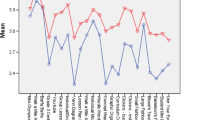Abstract
This paper reports on the use of a constructivist teaching/learning approach to improve first year pre-service primary teachers' confidence in, and attitude to, teaching science. The two-semester program was based on allowing the students to explore science concepts in detail during the first semester and then developing constructivist pedagogy in the second semester. There were many benefits reported by students including ownership of knowledge, the development of pedagogic skills and the use of group work to develop ideas. However, a number of concems were raised such as uncertainty of knowing what to do when exploring knowledge for themselves and the lack of note taking which occurred. A number of issues that need to be considered when re-implementing the program are discussed.
Similar content being viewed by others
References
Appleton, K. (1992). Discipline knowledge and confidence to teach science: Self perceptions of primary teacher education students.Research in Science Education, 22, 11–19.
Baird, J. R., & Mitchell, I. J. (1986).Improving the quality of teaching and learning: An Australian case study — the PEEL project Melbourne: Monash University Printery.
Baird, J. R., & Northfield, J. R. (1992).Learning from the PEEL experience Melbourne: Monash University Printing Services.
Blais, D. M. (1988). Constructivism: A theoretical revolution in teaching.Journal of Developmental Education, 11(3), 2–7.
Bodner, G. M. (1986). Constructivism: A theory of knowledge.Journal of Chemical Education, 63, 873–878.
Driver, R., & Oldham, V. (1986). A constructivist approach to curriculum development in science.Studies in Science Education, 13, 107–112.
Gunstone, R. F., Slattery, M., Baird, J. R., & Northfield, J. F. (1993). A case study exploration of development in pre-service science teachers.Science Education, 77(1), 47–73.
Hand, B., & Treagust, D. F. (1994). Teachers' thoughts about changing to constructivist teaching/learning approaches within junior secondary science classrooms.Journal of Education for Teaching, 20(1) 97–112.
Hardy, T., & Kirkwood, V. (1994). Towards creating effective learning environments for science teachers: The role of the tertiary educator.International Journal of Science Education, 16(2), 231–251.
Jeans, B., & Farnsworth, I. (1992). Primary science education: Views from three Australian states.Research in Science Education, 22, 214–223.
Kirkwood, V., Bearlin, M., & Hardy, T. (1989). New approaches to the inservice education in science and technology of primary and early childhood teachers (or Mum is not so dumb after all!).Research in Science Education, 19, 174–186.
Knafl, K., & Breitmayer, B. (1989). Triangulation in qualitative research: Issues of conceptual clarity and purpose. In J. M. Morse (Ed.),Qualitative nursing research: A contemporary dialogue. Maryland: Aspen Publishers.
Merriam, S. (1988).Case study research in education — A qualitative approach. San Francisco: Jossey Bass.
Mathison, S. (1988). Why triangulate?Educational Researcher, 17(2), 13–17.
Parson, S. (1991). Pre-service secondary science teachers making sense of constructivism.Research in Science Education, 21, 271–280.
Skamp, K. (1989). General science knowledge and attitudes towards science teaching of preservice primary teachers: Implications for pre-service units.Research in Science Education 19, 257–267.
Speedy, G. (Ed.) (1989).Discipline review of teacher training in mathematics and science. Camberra: Australian Government Publishing Service.
Stofflett, R. T. (1994). The accommodation of science pedagogical knowledge: The application of conceptual constructs to teacher education.Journal of Research in Science Teaching, 31(8), 787–810.
Stofflett, R. T., & Stoddart, T. (1994). The ability to understand and use conceptual change pedagogy as a function of prior content learning experience.Journal of Research in Science Teaching, 31(1), 31–51.
von Glasersfeld, E. (1988). The reluctance to change a way of thinking.The Irish Journal of Psychology, 9(1), 83–90.
von Glasersfeld, E. (1989a). An exposition of constructivism: Why some like it radical. In R. B. Davis, C. A. Maher, & N. Noddings (Eds.),Constructivist views on the teaching and learning of mathematics. Virginia: The National Council of Teachers of Mathematics.
von Glasersfeld, E. (1989b). Cognition, construction of knowledge, and teaching.Synthese, 80, 121–140.
von Glasersfeld, E. (1989c). Knowing without metaphysics: Aspects of the radical constructivist position. In F. Steier (Ed.),Research and reflexivity: Toward a cybernetic/social constructivist way of knowing. London: Sage.
White, R. T., & Gunstone, R. F. (1992).Probing understanding London: Falmer Press.
Yates, S., & Goodrum, D. (1990). How confident are primary science teachers in teaching science?Research in Science Education, 20, 300–305.
Author information
Authors and Affiliations
Corresponding author
Rights and permissions
About this article
Cite this article
Hand, B., Peterson, R. The development, trial and evaluation of a constructivist teaching and learning approach in a preservice science teacher education program. Research in Science Education 25, 75–88 (1995). https://doi.org/10.1007/BF02356461
Issue Date:
DOI: https://doi.org/10.1007/BF02356461




